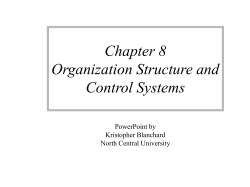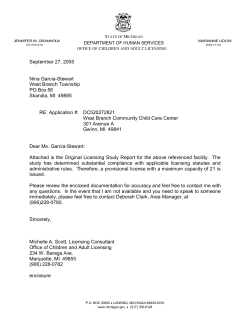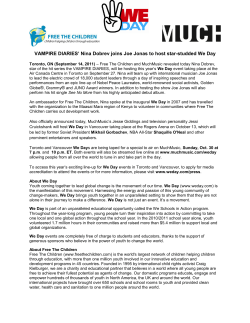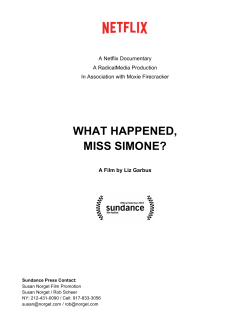
Speaker: Prof. Nina Asher Topic: âTo be very frank, I am a product of
School of Education Studies Invites you to a Talk by Speaker: Prof. Nina Asher Professor, Department of Curriculum & Instruction University of Minnesota-Twin Cities, Minneapolis, USA Topic: “To be very frank, I am a product of these times, I am trained to be an opportunist:” Identities, Cultures, and Education in an Economically Liberalized, Postcolonial India Venue: Room MO. 311-312, Administrative Block, AUD Date: April 9, 2015 (Thursday) Time: 2.30 pm to 4.30 pm Your schedules permitting, please join in for this event. Please see below abstract and bionote for more details about the talk and the speaker. Regards, Manish Jain Abstract of the Talk “To be very frank, I am a product of these times, I am trained to be an opportunist:” Identities, Cultures, and Education in an Economically Liberalized, Postcolonial India Nina Asher, Ed.D., Professor, University of Minnesota-Twin Cities, Minneapolis, MN, USA (nasher@umn.edu ) “Very recently I have started working in elementary education. I am an engineer and I have worked in the corporate sector. That is another problem of my generation and also rewarding in some sense. …. To be very frank, I am a product of these times, I am trained to be an opportunist. My education has taught me this. …. I realized when I worked in engineering that it is easily replicable. I was 24 at that time. I thought if I didn’t come here for 15 days, anybody could do it in my place. I wasn’t really required. That went against all the thing is held valid of being a good, thoughtful person.” Asha – a master’s student in education who was a participant in my study Globalization and postcolonialism are inextricably intertwined. Scholars have noted the ambivalent, relationship of the colonizer and the colonized (e.g. Bhabha, 1994; Fanon, 1952/1967; Gandhi, 1998) and the effects of capitalist ideology across the globe (e.g. Alexander & Mohanty, 1997; Appadurai, 1996; Prashad, 2006). Of course, the postcolonial situation is not identical in all parts of the world. Nonetheless, transnational forms of colonial oppression are controlled by the spread of Westernized imperialism through the globalization of the labor market, new technologies, and global financial markets. Critical thinkers in the education field in the U.S. (e.g., Kumashiro, 2008; Taubman, 2009) and India (e.g. National Council of Educational Research and Teaching [NCERT], 2005; Sadgopal, 2009) have noted that the last two decades have been marked by a focus on individual monetary gain (often read as “wealth” and “success”); facile, virtual proximity afforded by digitization; the spread of western-style capitalism and corporatization across nations; and the effects of consumerism, debilitating economic collapses, and environmental depletion – all in a context of increasing global interdependence. Privatization, standardization, and high-stakes testing now shape education and schooling. In this paper, situating myself as an Indian-born, U.S.-based scholar whose scholarship draws on postcolonial, feminist, globalization, and critical multicultural discourses in relation to education, I draw on qualitative data that I gathered for my Fulbright-funded project, Examining the Intersections of Globalization, Privatization, and Education after two decades of Economic Liberalization in India, to build further on this discussion and consider ways in which educators (can) resist recolonization in terms of educational theory, research, and practice in transnational contexts. References Alexander, M.J. & Mohanty, C.T. (Eds.). (1997). Feminist genealogies, colonial legacies, democratic futures. New York: Routledge. Appadurai, A. (1996). Modernity at large: Cultural dimensions of globalization. Minneapolis, MN: University of Minnesota Press. Bhabha, H. K. (1994). Location of culture. New York: Routledge. Fanon, F. (1967/1952). Black skin, white masks. New York: Grove Press. Gandhi, L. (1998). Postcolonial theory: A critical introduction. New York: Columbia University Press. Kumashiro, K. K. (2008). The seduction of common sense: How the right has framed the debate on America’s schools. New York, NY: Teachers College Press. National Council of Educational Research and Teaching (NCERT). (2005). National curriculum framework (NCF). New Delhi, India: Government of India, Ministry of Human Resource Development, Department of Secondary & Higher Education. Prashad, V. (2006). The global war against teachers. Radical History Review, 95, 9-20. Sadgopal, A. (2009). India’s educational policy: A historical overview. Unpublished manuscript. Taubman, P. M. (2009). Teaching by numbers: Deconstructing the discourse of standards and accountability in education. New York, NY: Routledge. Biographical Note Nina Asher (Ed.D., 1999, Teachers College, Columbia University), is a Professor in the Department of Curriculum and Instruction, University of Minnesota-Twin Cities. She was Department Chair from July 2011-June 2014. Nina is also an affiliate faculty member in the Department of Gender, Women and Sexuality Studies (GWSS). Nina writes in the areas of postcolonialism and feminism, globalization, critical perspectives on multiculturalism, and Asian American studies in education. She has published over 30 articles and book chapters and her work has appeared in such leading national and international journals as the Educational Researcher, Teachers College Record, Postcolonial Directions in Education, International Journal of Qualitative Studies in Education, and Discourse: Studies in the Cultural Politics of Education, among others. Nina is the recipient of a 2014-15 Fulbright-Nehru Academic and Professional Excellence Award (Research) for her project, Examining the Intersections of Globalization, Privatization, and Education after two decades of Economic Liberalization in India, and will be conducting this research in India during her sabbatical in the 2014-15 academic year. Nina is Book Review Editor for the International Journal of Qualitative Studies in Education, since 2007 and, from 2007-2009, was also Book Review Editor for the National Women’s Studies Association Journal (now Feminist Formations). Nina has served as a member of several national committees, including the Fellowship Review Panel for the International Fellowships Program of the American Association of University Women (AAUW) and the Canon Project Task Force of the American Association for the Advancement of Curriculum Studies (AAACS). From 2004-07, she was the inaugural Chair of the Postcolonial Studies and Education Special Interest Group (SIG) of the American Educational Research Association (AERA), the premier research organization in the field in North America. Nina also served as Chair of the Nominating Committee of AERA’s Curriculum Studies Division (Division B) from 2011-2013 and of AERA’s Teaching and Teacher Education Division (Division K) during 2013-14. From 1999-2011, Nina was on the faculty at Louisiana State University, where she served as Co-Director of the Curriculum Theory Project (CTP) from 2007-10.
© Copyright 2025















